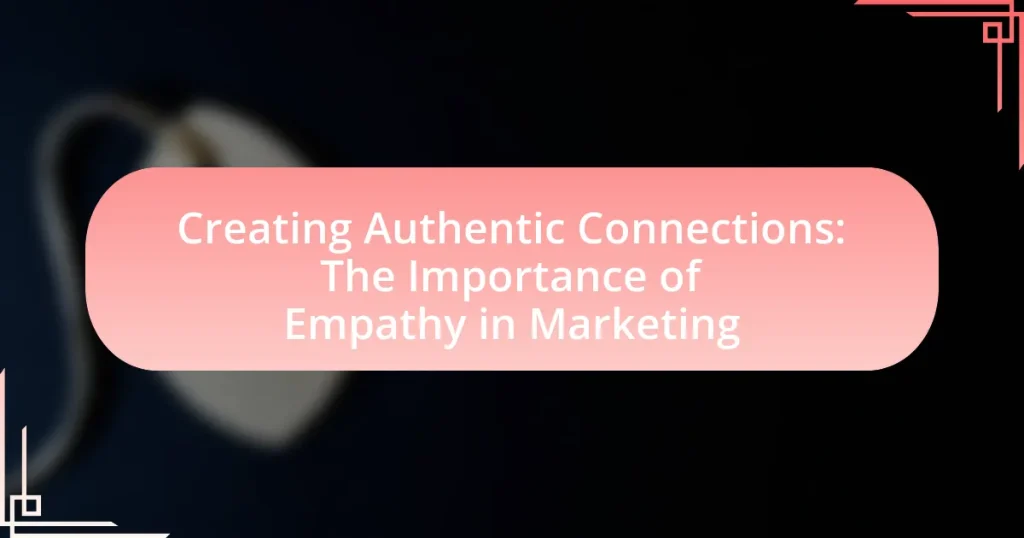The article “Creating Authentic Connections: The Importance of Empathy in Marketing” emphasizes the critical role of empathy in understanding consumer needs and emotions, which enhances brand loyalty and customer satisfaction. It explores how empathetic marketing influences consumer behavior, builds trust, and fosters emotional connections, ultimately driving business success. Key elements such as authenticity, storytelling, and customer feedback are highlighted as essential for developing empathy within marketing strategies. Additionally, the article discusses practical applications of empathy in marketing campaigns and customer service interactions, while addressing challenges and misconceptions marketers face in implementing empathetic approaches.

What is the role of empathy in marketing?
Empathy in marketing plays a crucial role in understanding and addressing the needs and emotions of consumers. By leveraging empathy, marketers can create campaigns that resonate deeply with their target audience, fostering stronger emotional connections and brand loyalty. Research indicates that brands that demonstrate empathy can increase customer satisfaction and engagement; for instance, a study by the Harvard Business Review found that emotionally connected customers are more than twice as valuable as highly satisfied customers. This highlights that empathy not only enhances the customer experience but also drives business success.
How does empathy influence consumer behavior?
Empathy significantly influences consumer behavior by fostering emotional connections between brands and consumers. When consumers perceive that a brand understands their feelings and needs, they are more likely to develop loyalty and trust towards that brand. Research indicates that empathetic marketing strategies can lead to increased customer satisfaction and higher purchase intentions. For instance, a study published in the Journal of Consumer Research found that consumers who felt emotionally connected to a brand were 50% more likely to make a purchase. This demonstrates that empathy not only enhances the consumer experience but also drives sales and brand loyalty.
What psychological factors are affected by empathetic marketing?
Empathetic marketing significantly affects psychological factors such as emotional engagement, trust, and consumer loyalty. Emotional engagement occurs when marketing messages resonate with consumers’ feelings, leading to a stronger connection with the brand. Trust is built through authentic communication that demonstrates understanding and care for consumer needs, which can enhance brand credibility. Additionally, empathetic marketing fosters consumer loyalty by creating a sense of belonging and community, as consumers feel valued and understood. Research indicates that brands employing empathetic marketing strategies can see a 20% increase in customer retention rates, highlighting the effectiveness of these psychological impacts.
How does empathy enhance brand loyalty?
Empathy enhances brand loyalty by fostering deeper emotional connections between consumers and brands. When brands demonstrate understanding and compassion towards their customers’ needs and experiences, they create a sense of trust and belonging. Research indicates that 70% of consumers are more likely to remain loyal to a brand that shows empathy, as it leads to positive customer experiences and increased satisfaction. This emotional engagement encourages repeat purchases and brand advocacy, ultimately driving long-term loyalty.
Why is authenticity important in marketing?
Authenticity is important in marketing because it builds trust and fosters genuine connections with consumers. When brands present themselves authentically, they resonate more deeply with their audience, leading to increased customer loyalty and engagement. Research indicates that 86% of consumers consider authenticity a key factor when deciding which brands to support, highlighting its critical role in consumer decision-making. Furthermore, authentic marketing can differentiate a brand in a crowded marketplace, as consumers are more likely to choose brands that align with their values and beliefs.
What are the key elements of authentic marketing?
The key elements of authentic marketing include transparency, storytelling, empathy, and community engagement. Transparency involves being honest about products and practices, which builds trust with consumers. Storytelling connects brands to their audience on an emotional level, making the brand relatable and memorable. Empathy allows marketers to understand and address the needs and feelings of their audience, fostering deeper connections. Community engagement encourages brands to interact with their customers, creating a sense of belonging and loyalty. These elements collectively enhance brand credibility and foster lasting relationships with consumers.
How does authenticity relate to consumer trust?
Authenticity directly enhances consumer trust by fostering a sense of reliability and transparency in brands. When consumers perceive a brand as authentic, they are more likely to believe that the brand’s claims and values align with their own, leading to increased loyalty and repeat purchases. Research by the Harvard Business Review indicates that 64% of consumers cite shared values as the primary reason they have a relationship with a brand, highlighting the importance of authenticity in building trust.

How can marketers develop empathy?
Marketers can develop empathy by actively engaging with their target audience through research, feedback, and direct interactions. This involves conducting surveys, interviews, and focus groups to understand customer needs and emotions. For instance, a study by the Harvard Business Review found that companies that prioritize customer empathy see a 10% increase in customer satisfaction and loyalty. By analyzing customer data and behavior, marketers can tailor their strategies to resonate with their audience, fostering deeper connections and enhancing brand loyalty.
What techniques can be used to cultivate empathy in marketing teams?
To cultivate empathy in marketing teams, organizations can implement techniques such as role-playing, customer journey mapping, and regular feedback sessions. Role-playing allows team members to step into the shoes of customers, fostering a deeper understanding of their experiences and emotions. Customer journey mapping visually represents the customer experience, highlighting pain points and areas for improvement, which enhances the team’s ability to empathize with customers. Regular feedback sessions, where team members share insights from customer interactions, create an ongoing dialogue about customer needs and perspectives, reinforcing the importance of empathy in marketing strategies. These techniques are supported by research indicating that empathetic marketing leads to stronger customer relationships and increased brand loyalty.
How can storytelling enhance empathetic connections?
Storytelling enhances empathetic connections by allowing individuals to share experiences and emotions in a relatable manner. When stories are told, they evoke feelings and create mental imagery that helps listeners understand the perspectives of others. Research indicates that narratives activate the brain’s mirror neurons, which are responsible for empathy, making it easier for individuals to connect emotionally with the storyteller. For instance, a study published in the journal “Psychological Science” by Paul Zak found that stories can increase oxytocin levels, a hormone linked to empathy and social bonding. This physiological response reinforces the idea that storytelling is a powerful tool for fostering deeper emotional connections in various contexts, including marketing.
What role does customer feedback play in developing empathy?
Customer feedback is essential in developing empathy as it provides direct insights into customer experiences and emotions. By actively listening to feedback, businesses can understand the needs, pain points, and preferences of their customers, which fosters a deeper emotional connection. Research indicates that companies that prioritize customer feedback are 60% more likely to retain customers, demonstrating that understanding customer perspectives enhances loyalty and trust. This process of gathering and analyzing feedback allows organizations to tailor their offerings and communication strategies, ultimately leading to more empathetic interactions and stronger relationships with their audience.
How can data be used to foster empathy in marketing?
Data can be used to foster empathy in marketing by analyzing customer behavior and preferences to create personalized experiences. By leveraging data analytics, marketers can gain insights into the emotional triggers and pain points of their target audience, allowing them to tailor messages that resonate on a deeper level. For instance, a study by McKinsey found that companies that excel in customer experience can achieve revenue growth of 5 to 10% above their market average, demonstrating the effectiveness of empathetic marketing strategies. This data-driven approach enables brands to connect authentically with consumers, fostering loyalty and trust.
What types of data are most useful for understanding customer emotions?
Sentiment analysis data is most useful for understanding customer emotions. This type of data includes customer reviews, social media posts, and feedback surveys, which provide insights into how customers feel about products or services. For instance, a study by the Journal of Marketing Research found that analyzing sentiment in customer feedback can predict customer loyalty and satisfaction levels, demonstrating the effectiveness of sentiment analysis in capturing emotional responses. Additionally, behavioral data, such as purchase history and engagement metrics, can also reveal emotional triggers and preferences, further enhancing the understanding of customer emotions.
How can marketers analyze data to improve empathetic strategies?
Marketers can analyze data to improve empathetic strategies by utilizing customer feedback, behavioral analytics, and sentiment analysis. By systematically collecting and interpreting data from surveys, social media interactions, and purchase histories, marketers can gain insights into customer emotions and preferences. For instance, a study by McKinsey found that companies that effectively use customer insights can increase their revenue by 10-15%. This data-driven approach allows marketers to tailor their messaging and product offerings to resonate more deeply with their audience, fostering stronger emotional connections and enhancing customer loyalty.

What are the practical applications of empathy in marketing?
Empathy in marketing has practical applications that enhance customer engagement and brand loyalty. By understanding and addressing the emotional needs of consumers, brands can create personalized experiences that resonate deeply with their target audience. For instance, companies like Nike utilize empathy by showcasing real stories of athletes overcoming challenges, which fosters a strong emotional connection with consumers. Research indicates that brands that demonstrate empathy can increase customer satisfaction by up to 30%, as they are perceived as more relatable and trustworthy. This approach not only drives sales but also cultivates long-term relationships, ultimately benefiting brand reputation and customer retention.
How can empathy be integrated into marketing campaigns?
Empathy can be integrated into marketing campaigns by understanding and addressing the emotional needs and experiences of the target audience. Marketers can achieve this by conducting thorough audience research, utilizing surveys and focus groups to gather insights on consumer feelings and motivations. For instance, brands like Dove have successfully used empathy in their campaigns by promoting body positivity and self-acceptance, resonating deeply with their audience’s personal struggles. This approach not only fosters a sense of connection but also enhances brand loyalty, as consumers are more likely to support brands that genuinely understand and reflect their values and experiences.
What are some successful examples of empathetic marketing campaigns?
Some successful examples of empathetic marketing campaigns include Dove’s “Real Beauty” campaign, which challenged traditional beauty standards by featuring real women of diverse shapes and sizes, leading to a 700% increase in sales. Another example is Nike’s “Dream Crazy” campaign, which highlighted Colin Kaepernick’s activism, resonating with consumers and resulting in a 31% increase in online sales shortly after its launch. Additionally, Always’ “Like a Girl” campaign aimed to empower young girls and change the negative connotation of the phrase, contributing to a significant increase in brand favorability. These campaigns demonstrate how brands can connect with audiences on an emotional level, driving both engagement and sales.
How can empathy improve customer service interactions?
Empathy can significantly improve customer service interactions by fostering a deeper understanding of customer needs and emotions. When customer service representatives demonstrate empathy, they can effectively address concerns, leading to increased customer satisfaction and loyalty. Research indicates that 70% of buying experiences are based on how the customer feels they are being treated, highlighting the importance of emotional connection in service interactions. By actively listening and validating customer feelings, representatives can create a more positive experience, ultimately enhancing brand reputation and driving repeat business.
What challenges do marketers face when implementing empathy?
Marketers face several challenges when implementing empathy, primarily due to the difficulty in accurately understanding and interpreting consumer emotions. This challenge arises from the subjective nature of emotions, which can vary widely among individuals and cultures. Additionally, marketers often struggle with integrating empathetic insights into their strategies, as traditional data-driven approaches may not capture the nuances of human feelings. Research indicates that 70% of consumers expect brands to understand their needs and emotions, yet only 30% feel that brands actually do, highlighting a significant gap in empathetic engagement. This disconnect can lead to ineffective marketing campaigns that fail to resonate with target audiences.
How can marketers overcome resistance to empathetic approaches?
Marketers can overcome resistance to empathetic approaches by demonstrating the tangible benefits of empathy in building customer loyalty and trust. Research indicates that brands that prioritize empathy see a 60% increase in customer satisfaction and a 50% increase in repeat purchases. By sharing case studies and testimonials that highlight successful empathetic marketing campaigns, marketers can illustrate how understanding customer emotions leads to better engagement and higher sales. Additionally, training teams in active listening and emotional intelligence can further enhance their ability to connect with customers, thereby reducing resistance to empathetic strategies.
What are common misconceptions about empathy in marketing?
Common misconceptions about empathy in marketing include the belief that empathy is merely a tool for manipulation and that it is only relevant for customer service interactions. Many marketers assume that empathy is about exploiting emotions to drive sales, rather than genuinely understanding and addressing customer needs. Additionally, some think that empathy is unnecessary for brands with established products, overlooking its role in fostering loyalty and connection. Research indicates that brands demonstrating authentic empathy can enhance customer satisfaction and retention, as shown in a study by the Harvard Business Review, which found that emotionally connected customers are more than twice as valuable as highly satisfied customers.
What best practices can marketers follow to create authentic connections?
Marketers can create authentic connections by prioritizing empathy, transparency, and personalization in their strategies. Empathy allows marketers to understand and resonate with their audience’s emotions and needs, fostering trust and loyalty. For instance, brands that actively listen to customer feedback and adapt their offerings accordingly demonstrate a commitment to their audience, which can lead to increased engagement. Transparency in communication, such as openly sharing company values and practices, enhances credibility and strengthens relationships. Personalization, achieved through data-driven insights, enables marketers to tailor messages and experiences that reflect individual preferences, making customers feel valued. Research shows that 80% of consumers are more likely to make a purchase when brands offer personalized experiences, highlighting the effectiveness of these practices in building authentic connections.

